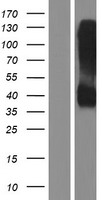KIR2DL2 (NM_014219) Human Tagged ORF Clone
CAT#: RC224797
KIR2DL2 (Myc-DDK-tagged)-Human killer cell immunoglobulin-like receptor, two domains, long cytoplasmic tail, 2 (KIR2DL2)
ORF Plasmid: tGFP
"NM_014219" in other vectors (4)
Need custom modification / cloning service?
Get a free quote
CNY 5,488.00
CNY 300.00
Specifications
| Product Data | |
| Type | Human Tagged ORF Clone |
| Tag | Myc-DDK |
| Synonyms | CD158b; CD158B1; NKAT-6; NKAT6; p58.2 |
| Vector | pCMV6-Entry |
| E. coli Selection | Kanamycin (25 ug/mL) |
| Mammalian Cell Selection | Neomycin |
| Sequence Data |
>NM_014219 ORF sequence, RC224797 may differ due to SNPs.
Blue=ORF Red=Cloning site Green=Tag(s) GCTCGTTTAGTGAACCGTCAGAATTTTGTAATACGACTCACTATAGGGCGGCCGGGAATTCGTCGACTG GATCCGGTACCGAGGAGATCTGCCGCCGCGATCGCC ATGTCGCTCATGGTCGTCAGCATGGCGTGTGTTGGGTTCTTCTTGCTGCAGGGGGCCTGGCCACATGAG GGAGTCCACAGAAAACCTTCCCTCCTGGCCCACCCAGGTCGCCTGGTGAAATCAGAAGAGACAGTCATC CTGCAATGTTGGTCAGATGTCAGGTTTGAGCACTTCCTTCTGCACAGAGAAGGGAAGTTTAAGGACACT TTGCACCTCATTGGAGAGCACCATGATGGGGTCTCCAAAGCCAACTTCTCCATCGGTCCCATGATGCAA GACCTTGCAGGGACCTACAGATGCTACGGTTCTGTTACTCACTCCCCCTATCAGTTGTCAGCTCCCAGT GACCCTCTGGACATCGTCATCACAGGTCTATATGAGAAACCTTCTCTCTCAGCCCAGCCGGGCCCCACG GTTCTGGCAGGAGAGAGCGTGACCTTGTCCTGCAGCTCCCGGAGCTCCTATGACATGTACCATCTATCC AGGGAGGGGGAGGCCCATGAATGTAGGTTCTCTGCAGGGCCCAAGGTCAACGGAACATTCCAGGCCGAC TTTCCTCTGGGCCCTGCCACCCACGGAGGAACCTACAGATGCTTCGGCTCTTTCCGTGACTCTCCATAC GAGTGGTCAAACTCGAGTGACCCACTGCTTGTTTCTGTCACAGGAAACCCTTCAAATAGTTGGCCTTCA CCCACTGAACCAAGCTCTAAAACCGGTAACCCCCGACACCTGCACATTCTGATTGGGACCTCAGTGGTC ATCATCCTCTTCATCCTCCTCTTCTTTCTCCTTCATCGCTGGTGCTCCAACAAAAAAAATGCTGCGGTA ATGGACCAAGAGTCTGCAGGGAACAGAACAGCGAATAGCGAGGACTCTGATGAACAAGACCCTCAGGAG GTGACATACACACAGTTGAATCACTGCGTTTTCACACAGAGAAAAATCACTCGCCCTTCTCAGAGGCCC AAGACACCCCCAACAGATATCATCGTGTACACGGAACTTCCAAATGCTGAGTCCAGATCCAAAGTTGTC TCCTGCCCA ACGCGTACGCGGCCGCTCGAGCAGAAACTCATCTCAGAAGAGGATCTGGCAGCAAATGATATCCTGGAT TACAAGGATGACGACGATAAGGTTTAAACGGCCGGC >Peptide sequence encoded by RC224797
Blue=ORF Red=Cloning site Green=Tag(s) MSLMVVSMACVGFFLLQGAWPHEGVHRKPSLLAHPGRLVKSEETVILQCWSDVRFEHFLLHREGKFKDT LHLIGEHHDGVSKANFSIGPMMQDLAGTYRCYGSVTHSPYQLSAPSDPLDIVITGLYEKPSLSAQPGPT VLAGESVTLSCSSRSSYDMYHLSREGEAHECRFSAGPKVNGTFQADFPLGPATHGGTYRCFGSFRDSPY EWSNSSDPLLVSVTGNPSNSWPSPTEPSSKTGNPRHLHILIGTSVVIILFILLFFLLHRWCSNKKNAAV MDQESAGNRTANSEDSDEQDPQEVTYTQLNHCVFTQRKITRPSQRPKTPPTDIIVYTELPNAESRSKVV SCP TRTRPLEQKLISEEDLAANDILDYKDDDDKV |
| Chromatograms |
CHROMATOGRAMS
 Sequencher program is needed, download here. |
| Restriction Sites |
SgfI-MluI
Cloning Scheme for this gene
Plasmid Map

|
| ACCN | NM_014219 |
| ORF Size | 1044 bp |
| OTI Disclaimer | Due to the inherent nature of this plasmid, standard methods to replicate additional amounts of DNA in E. coli are highly likely to result in mutations and/or rearrangements. Therefore, OriGene does not guarantee the capability to replicate this plasmid DNA. Additional amounts of DNA can be purchased from OriGene with batch-specific, full-sequence verification at a reduced cost. Please contact our customer care team at custsupport@origene.com or by calling 301.340.3188 option 3 for pricing and delivery. The molecular sequence of this clone aligns with the gene accession number as a point of reference only. However, individual transcript sequences of the same gene can differ through naturally occurring variations (e.g. polymorphisms), each with its own valid existence. This clone is substantially in agreement with the reference, but a complete review of all prevailing variants is recommended prior to use. More info |
| OTI Annotation | This clone was engineered to express the complete ORF with an expression tag. Expression varies depending on the nature of the gene. |
| Product Components | The ORF clone is ion-exchange column purified and shipped in a 2D barcoded Matrix tube containing 10ug of transfection-ready, dried plasmid DNA (reconstitute with 100 ul of water). |
| Reconstitution | 1. Centrifuge at 5,000xg for 5min. 2. Carefully open the tube and add 100ul of sterile water to dissolve the DNA. 3. Close the tube and incubate for 10 minutes at room temperature. 4. Briefly vortex the tube and then do a quick spin (less than 5000xg) to concentrate the liquid at the bottom. 5. Store the suspended plasmid at -20°C. The DNA is stable for at least one year from date of shipping when stored at -20°C. |
| Note | Plasmids are not sterile. For experiments where strict sterility is required, filtration with 0.22um filter is required. |
| Reference Data | |
| RefSeq | NM_014219.2 |
| RefSeq Size | 1587 bp |
| RefSeq ORF | 1047 bp |
| Locus ID | 3803 |
| UniProt ID | P43627 |
| Protein Families | Transmembrane |
| Protein Pathways | Antigen processing and presentation, Graft-versus-host disease, Natural killer cell mediated cytotoxicity |
| MW | 38.5 kDa |
| Gene Summary | Killer cell immunoglobulin-like receptors (KIRs) are transmembrane glycoproteins expressed by natural killer cells and subsets of T cells. The KIR genes are polymorphic and highly homologous and they are found in a cluster on chromosome 19q13.4 within the 1 Mb leukocyte receptor complex (LRC). The gene content of the KIR gene cluster varies among haplotypes, although several "framework" genes are found in all haplotypes (KIR3DL3, KIR3DP1, KIR3DL4, KIR3DL2). The KIR proteins are classified by the number of extracellular immunoglobulin domains (2D or 3D) and by whether they have a long (L) or short (S) cytoplasmic domain. KIR proteins with the long cytoplasmic domain transduce inhibitory signals upon ligand binding via an immune tyrosine-based inhibitory motif (ITIM), while KIR proteins with the short cytoplasmic domain lack the ITIM motif and instead associate with the TYRO protein tyrosine kinase binding protein to transduce activating signals. The ligands for several KIR proteins are subsets of HLA class I molecules; thus, KIR proteins are thought to play an important role in regulation of the immune response. [provided by RefSeq, Jul 2008] |
Documents
| Product Manuals |
| FAQs |
| SDS |
Resources
Other Versions
| SKU | Description | Size | Price |
|---|---|---|---|
| RC224797L3 | Lenti ORF clone of Human killer cell immunoglobulin-like receptor, two domains, long cytoplasmic tail, 2 (KIR2DL2), Myc-DDK-tagged |
CNY 7,888.00 |
|
| RC224797L4 | Lenti ORF clone of Human killer cell immunoglobulin-like receptor, two domains, long cytoplasmic tail, 2 (KIR2DL2), mGFP tagged |
CNY 7,888.00 |
|
| RG224797 | KIR2DL2 (tGFP-tagged) - Human killer cell immunoglobulin-like receptor, two domains, long cytoplasmic tail, 2 (KIR2DL2) |
CNY 7,088.00 |
|
| SC304065 | KIR2DL2 (untagged)-Human killer cell immunoglobulin-like receptor, two domains, long cytoplasmic tail, 2 (KIR2DL2) |
CNY 5,488.00 |
其它KIR2DL2产品


 United States
United States
 Germany
Germany
 Japan
Japan
 United Kingdom
United Kingdom
 China
China



